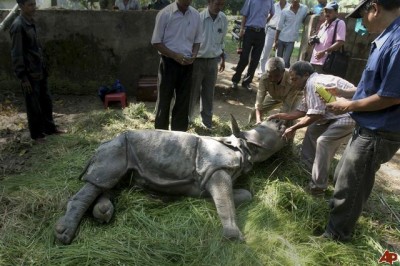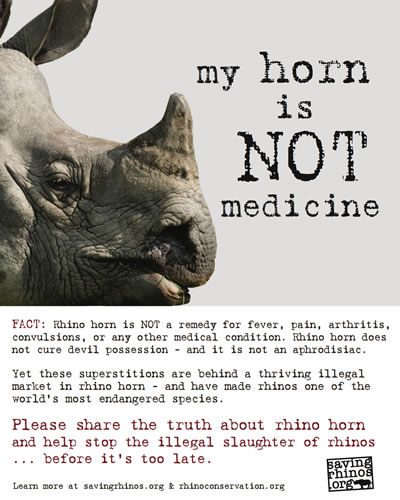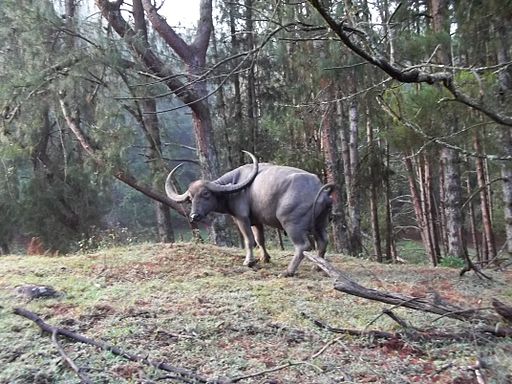Poachers’ task to wipe away wildlife in Asia and Africa, has just been made tougher by Google. World Wildlife Fund (WWF) today received a major grant from Google to use state-of-the-art technology to help protect endangered species like elephants, rhinos and tigers from poachers and wildlife traffickers.
Under the Global Impact Award, Google gave a grant of $5 Million to WWF so that the organization could develop and use high-tech sensors, conservation drones, and wildlife tagging technology. WWF also plans to use softwares and technologies that will aid forest rangers and stop the menace in the jungles created by poachers.
“With this grant, we can create an umbrella of technology to protect wildlife from global crime syndicates,” said Carter Roberts, President and CEO of World Wildlife Fund. “It’s all about new surveillance tools and patrol systems to stem what has become an explosion in poaching. Otherwise, we could see the end of species like rhinos and elephants in the wild.”
Poaching Menace
The three species that will get the most benefit from this Google gift will be Elephant, Tiger and Rhino – the most frequently killed endangered animals in the planet.
In India, 28 tigers have already died this year due to poaching. Elephants too have been brutally murdered for their tusks. But the most barbaric attack has been on Rhinos, with 39 of these creatures killed by animal traffickers for their horns. This year’s disastrous floods in Assam only made the poacher’s task easier.
Crawford Allen of TRAFFIC North America (TRAFFIC is the wildlife trade monitoring program of WWF) told NBC News that even when data is available through satellite surveys and other tools, these are not utilized properly because they are not integrated into one system.
He pointed out how authorities too shy away from using these systems.
“authorities aren’t always willing to put this kind of infrastructure in place on their own, whether because of cost or corruption” noting that wildlife trafficking is “very lucrative and officials in developing countries can be convinced to turn a blind eye for a price”.
Poaching and trafficking today has become the third largest criminal industry in the world. It is estimated to be worth $7-10 billion annually. Poaching is also not a single man’s opportunistic killing any more. It is an organized crime with gangs involved that use sophisticated arms and ammunitions to kill wild animals. Locals, and corrupt forest officials usually work hand in hand with these poachers to earn some easy money per kill.
As per a forest official recently put behind bars by Assam forest department, he was given 1.5 lakh rupees per animal, just for providing information about the whereabouts of a rhino in the jungle!
The parts of the killed animals, including bone, skin, brain, horns, tusks are sold for millions in illegal animal markets worldwide. Some of these products are also used as medicines.
But one sudden death of a wild animal can devastate the complete food chain, ecological stability and the ecosystem of a region. Take for example the case of a tiger. If one tiger is killed in a jungle, the prey population of deers automatically increases. These herbivores can eradicate forests. So, one death puts into motion a complete circle of devastation.
The Google grant therefore, can help forest rangers become as sharp and tech-savvy as their enemies.
What WWF plans to do
WWF and TRAFFIC, the wildlife trade monitoring network, have already launched a campaign to elevate the global response to wildlife crime through better enforcement, stronger penalties and international cooperation against wildlife trafficking.
“We face an unprecedented poaching crisis. Killings are way up. We need solutions that are as sophisticated as the threats we face. This pushes the envelope in the fight against wildlife crime,” Roberts added.
The organization will target its conservation programmes to areas in Africa and Asia where poaching is a major concern. Satellite imaging, camera traps, use of aerial systems that can operate without humans and give information about difficult terrains are some of the tools whose use will be increased. The forest rangers of the nations like South Africa, Nepal and India will be better trained, and better equipped to combat wildlife terrorism – as it should be called.
With Google backing WWF, the $5 Million will go a long way in securing the future of under threat animals.
More Related Stories,
Spies in the Sky saving Wildlife
Pet Parrot Trade Killing Millions of Birds
Interesting facts about the Indian Elephant
Images via ecotravellerguide.com, rhinoconservation.org









2 thoughts on “Google gives 5 Million Dollars to WWF for its War against Wildlife Crime”